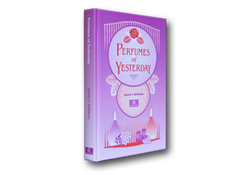Perfumes Of Yesterday By David G. Williams
Perfumes Of Yesterday
By David G. Williams
160 x 240 mm, 6.5" x 9.5"
Hardback, 408 pages
"This book is about the perfumes which were commonly made and sold in the perfumeries and chemists' shops in Britain over a period of some two hundred years from about the beginning of the eighteenth century, soon after Jean-Antoine Farina moved from Italy to settle in the German city of Cologne, which gave its name to the most popular toilet water of all time."
So begins Perfumes of Yesterday, which provides a fascinating account of the development of perfumery, as it progressed mainly from the seventeenth to the twentieth centuries. It focuses particularly on the Victorian and Edwardian eras in Britain, but also follows the parallel development of perfumery in other countries in Europe.
The book's purpose is to provide a study of the old and mostly simple examples of the perfumer's art in order to gain some insight into the ancestry, and therefore a better understanding, of the more complex fragrances of today, themselves already the progenitors of the perfumes of tomorrow.
The historical approach of the first part of the book gives context to its main section – formularies of perfumes and toilet waters that have been gathered from published articles and books dating from or before the 1920s and which relate mostly to perfumes of much earlier origin, some from as far back as the eighteenth century, when chemistry had yet to become an exact science and the possibility of its application to perfumery quite beyond imagination. One recipe for an Eau de Cologne dates from 1700.
Following each formula is a discussion of various aspects of the perfume: its composition; the geographical and botanical sources of its ingredients and the method of extraction of its essential oils; its odour properties and the fragrance effects resulting from its particular combination of ingredients – and, here, an analysis of the composition of some of the apparently simple perfumes reveals a staggering complexity of major, minor and trace components. The discussion may also cover the historical context of a perfume's use; the history behind its name; and the counterparts of its ingredients in modern perfumery.
The book concludes with a discourse on the perfumes of today and tomorrow. The main sections are followed by five appendices, a glossary of some technical terms, a reading list and an index.
While the book is intended primarily for the professional perfumer and students of perfumery, it is hoped that the variety of information and the insights that it provides, not only in relation to perfumery production methods and ingredient sources, but also to the social history of perfumery and the psychology of perfume, will be of interest to the more general reader.
"Perfumes of Yesterday is an excellent review of the history of perfumery from a master of the subject who has taught and inspired many of those who work in the industry today...This treasure trove of a book will prove a valuable source of information and inspiration for those in the fragrance industry and could have wider appeal as a record of social and technological history."
Charles Sell, Chemistry World, January 2005
"Having now read this very fine book, which I commend to all students of perfumery and also their master perfumer mentors and tutors, and indeed to the many lovers of good books about the fascinating subject of perfumery history, I consider that the book is a 'must have' and should be sought from the publisher without delay."
John Bailey - Founder, The Perfumers Guild Ltd
"The introduction and the chronicle of the 18th-20th centuries provide a... 75-page tour de force of the transition from art-and-craft tradition to science and technology...those seriously interested in perfumery will find a unique collection of what appear to be quite carefully prepared formulations for perfumes and toilet waters drawn from history... With surprisingly useful appendixes and indexes... Summing up: Highly recommended."
L.W. Fine, Columbia University - Choice: Current Reviews for Academic Libraries, April 2005












